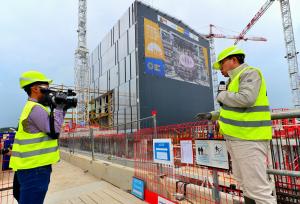ITER Media Days: journalists converge
10 Oct 2016
-
L.C.
The word is out. For journalists of all types—whether a national daily, an online high-tech magazine, an international wire service, or a physics trade press publication; whether armed with a laptop and pocket recorder, full video crew, or good old pen and notepad—the ITER worksite these days makes for a fine story.
TV crews spent as much time as possible in the Tokamak Pit, where they encountered a dense forest of rebar and concrete (pictured: China's CCTV).
On 6 and 7 October, a prestigious group of journalists participated in ITER's Media Days. The group was diverse: Süddeutsche Zeitung, El Pais, The New York Times, Xinhua, Le Figaro, Gazeta Wyborcza, World Nuclear News, Diario de Noticias, China Science and Technology Daily, Reuters News, TASS, EFE, Kyodo News Agency, and CCTV are but a sampling.
ITER Director-General Bernard Bigot kicked off the event with an overview of the project, from its historical roots through current global manufacturing operations and complex construction and assembly parameters. In the sessions that ensued, the journalists heard from Richard Kamendje of the IAEA on the coming fusion energy era, from Mark Henderson of the Heating & Current Drive Division on what it's like to be an ITER scientist, and from each of the Domestic Agencies on aspects of their procurement, high-tech manufacturing, and transport operations. Many chose to have follow-on interviews with the Director-General as well as with engineers and scientists from their countries of origin. And on the second day, the bulk of the group headed to the Constructions Industrielles de la Méditerranée (CNIM) in Toulon, where they were able to see the state of manufacturing of the massive ITER radial plates.
But the star of the show was clearly the worksite itself. TV crews spent as much time as possible in the Tokamak Pit, where they encountered the dense forest of rebar and concrete of the upper basement level and stepped through the subterranean levels of the diagnostics area. Some toured the contrasting indoor clean-room environment of the Poloidal Field Coils Winding Facility. A few complemented these impressions with a trip to the Virtual Room, ITER's 3D engineering design tool, or a mind-bending simulated aerial tour using ITER's newly captured drone videos on an Oculus Rift.
Each witnessed the slowly growing machine from a different angle. Each will likely tell a different story. But the group was unanimous in their view that the two days had given them superb insights into a fascinating project. And they were happy to give constructive feedback, ensuring that the next ITER Media Days will be even better.


